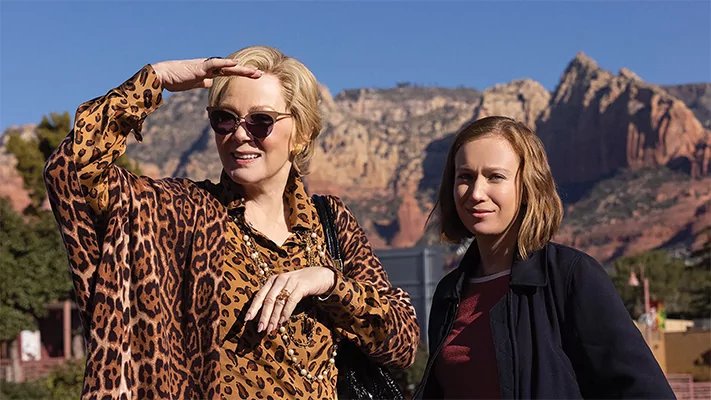
It isn’t often that a critic gets to tackle three seasons of a television comedy at once. Still less frequently may he do so after binging the whole gut-busting run-in-progress in a matter of days. Yet here I am, fresh from 27 episodes of HBO’s hilarious, wise, and, yes, generous series Hacks. If the following contains typos, forgive me. My body and brain still ache from laughing.
Hacks would seem, at a glance, a strange candidate for a midrun testimonial. (HBO has just renewed the show for a fourth season.) An Emmy winner for acting, directing, and writing, the series ought to be on the lips of the entire clickbait intelligentsia, filling digital column inches from the Ringer to Slate. Oddly, however, the show has received a mere fraction of the attention given to lesser productions such as Hulu’s The Bear. The reason is clear enough: Hacks has political jokes but no ideological hook to rival The Bear’s working-class bona fides. If Veep, another very online darling, existed to take down our hopelessly mercenary office-seeking class, Hacks is merely funny. Indeed, it is far funnier.

The production stars Jean Smart as Deborah Vance, a legendary comedian with a long-running Las Vegas residency. As the series opens, Deborah receives news that she is losing her weekend shows to make room for acts beloved by “idiots in their 20s” (example: “a beatbox-forward a cappella group” that does “medleys”). Made fabulously wealthy by a QVC product empire, Deborah could easily ride into the Nevada sunset, content with her status as a cultural icon. Happily for us, our heroine is a doggedly competitive workaholic with no plans to retire. Wouldn’t new, spicier material make her irresistible to the men who own Sin City’s stages?
Enter Ava Daniels (Hannah Einbinder), a 25-year-old comedy writer in the throes of a mini-cancelation. Having tweeted with insufficient reverence about a congressman’s gay son, Ava has made herself unemployable except at the margins of the entertainment world. When, in a moment of enviable business genius, agent Jimmy LuSaque (co-creator Paul W. Downs) realizes that he can keep two deadweight clients busy by pairing them with each other, an inspiring duo is born. No, Deborah and Ava have nothing in common besides a diminishing set of options. But, yes, the relationship thus initiated is nevertheless 24-carat comedy gold.
Fewer television archetypes have grayer hair than the “odd couple.” Felix and Oscar, Kirk and Spock, Greg Hirsch and Tom Wambsgans: The device feels worn but works nearly every time. Central to its functioning is the requirement that both parties achieve likability — no small task given that most viewers loathe half of their fellow Americans. Indeed, for Hacks to play into that division would have been the simplest thing in the world. In Deborah, the show offers a lonely boomer fusspot with the politics of Dwight Eisenhower. Ava, meanwhile, is a woke-adjacent casual drug user whose hyperspecific sexual identity has been polished to a gemstone shine. It is a miracle of the TV gods that both women come across as interesting, sympathetic, and decent.
Toward this success, the series is helped tremendously by two of the finest comic performances in recent memory. An actress of impossible range, Smart was great in Frasier, great in 24, great in FX’s Fargo, and great in a slew of films from Garden State to The Accountant. It is no surprise that her Deborah Vance is as funny as George Costanza and as layered as Jimmy McGill. Rather, it is Einbinder’s revelatory work as Ava that most startles — in no small part because I wanted and expected to hate the character. A victim herself of the new orthodoxy, Ava is nonetheless the kind of person who urges others to avoid the phrase “master bedroom.” But she is also warm, self-effacing, and a wonderful sport. It takes rare confidence and class for a writers room to harmonize that dissonance.
An example may be of use: Midway through Season Two, on a gay cruise with Deborah (long story), Ava delivers a heartfelt speech on the impossibility of nailing down one’s sexuality. Yet, five minutes later, she shamelessly agrees with two lesbians that attraction is a simple men-or-women binary. Why? She wants to sleep with them, of course, and unanimity seems like a step in that direction! Like most of the show’s humor, the gag’s tone and timing are impeccable. The joke exists, however, only because Hacks is willing to use Generation Z’s sexual dogmas as grist for the comic mill rather than sermonettes for the rubes back home.
Other quips are of the punchy one-liner variety. “You look like you’re about to have lunch on a steel girder,” Deborah says of Ava’s boyish wardrobe. “It’ll probably be a dead end with an abortion clinic on it,” the comedian scoffs upon learning that a Las Vegas street will soon bear her name. While amusing in their own right, these zingers have a plot function as well. Ava’s primary task is to help Deborah upgrade her act. What was once a mere flurry of punchlines just may give way to something more intriguing. Think Rodney Dangerfield reborn as Louis C.K.
And so the series proceeds, with its two leads slowly feeling one another out, then developing a real, and at times moving, friendship. In Season One, Deborah prepares to leave her casino gig with 90 minutes of fresh material. Season Two sees the pair taking Deborah’s new act on the road, perfecting it, and working it into a TV special. Season Three concerns Deborah’s pursuit of a late-night hosting gig, a prize that has eluded her for decades. Along the way, we meet the usual collection of supporting players, some of whom (such as Jimmy’s so-annoying-she’s-charming assistant, Kayla) add welcome depth.
By any measure, though, the stars here are Deborah and Ava, two beautifully written characters who provide the 21st century’s best answer so far to Laverne & Shirley. Yes, Hacks really is that good. Do yourself a favor and watch it.
CLICK HERE TO READ MORE FROM THE WASHINGTON EXAMINER
Graham Hillard is editor at the James G. Martin Center for Academic Renewal and a Washington Examiner magazine contributing writer.





